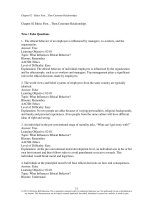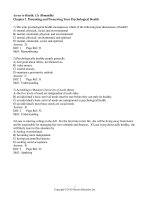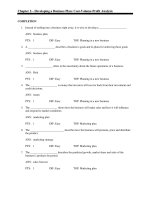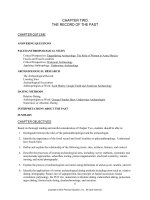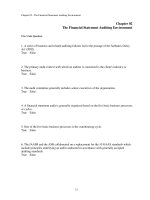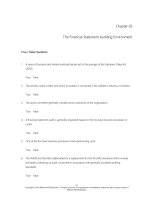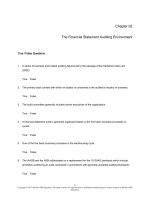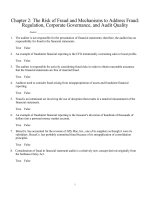Environmental science a global concern 12th edition cunningham test bank
Bạn đang xem bản rút gọn của tài liệu. Xem và tải ngay bản đầy đủ của tài liệu tại đây (19.83 KB, 6 trang )
Chapter 02 - Principles of Science and Systems
Chapter 02
Principles of Science and Systems
Multiple Choice Questions
1. _________________ is a process for producing knowledge methodically and logically.
A. Universalism
B. Science
C. Relativism
D. Morality
E. Parsimony
Bloom's: 1. Remember
Section: 02.01
Topic: Science
2. Ideally, science
A. Is correct most of the time
B. Tells us what we expected to find
C. Uses new technology
D. Is orderly and methodical
E. Proves that our hypotheses are correct
Bloom's: 1. Remember
Section: 02.01
Topic: Science
3. Which of the following is not an important feature of science?
A. Reproducibility
B. Parsimony
C. Empiricism
D. Positive proof
E. All are important
Bloom's: 2. Understand
Section: 02.01
Topic: Science
2-1
Chapter 02 - Principles of Science and Systems
4. Generally, distinguished scientists
A. Always agree if they really are expert scientists
B. May have different interpretations of the same evidence
C. Never disagree once a theory is established
D. Believe each other and support each other in their work
E. Always disagree so they can prove theories
Bloom's: 2. Understand
Section: 02.01
Topic: Science
5. Proof in science is always
A. Firmly established
B. Beyond question
C. An impossible goal
D. Changing very quickly
E. Open to question or new evidence
Bloom's: 2. Understand
Section: 02.01
Topic: Science
6. The statement, "Since every insect I have examined so far has six legs, I conclude that all
insects must have six legs." is an example of
A. Inductive reasoning
B. Deductive reasoning
C. Hypothesis testing
D. Reductive reasoning
E. Parsimony
Bloom's: 2. Understand
Section: 02.01
Topic: Science
2-2
Chapter 02 - Principles of Science and Systems
7. Of the following statements and questions, which is the best example of deductive
reasoning?
A. If all insects have six legs, then butterflies have six legs
B. In repeated tosses of a coin, there is a 50/50 chance of each toss resulting in a "head."
C. How many times will the toss of coins turn "heads-up" if 100 people each toss a coin?
D. Since every insect I have examined so far has six legs, I conclude that all insects must have
six legs
E. All of these are examples of deductive reasoning
Bloom's: 2. Understand
Section: 02.01
8. Although your sister is not a scientist, she says that she uses scientific techniques in her
everyday life. You do not believe her but she insists it is true. Which of the following examples
could she use to best persuade you?
A. When she cooks she measures ingredients and puts them together to form something else
(e.g., a cake)
B. When she drives in her car she hypothesizes about things (e.g., when the red light will turn
green)
C. She put some tomatoes in the sun and some in the shade to see if the sun causes them to
ripen faster
D. She buys a brand of toothpaste based on statistical data (four out of five dentists recommend
it)
E. All of these are examples of using scientific techniques in her everyday life
Bloom's: 2. Understand
Section: 02.01
Topic: Science
9. Experiments in which conditions are deliberately altered and all other variables are held
constant are known as ___________ experiments.
A. Manipulative
B. Natural
C. Hypothetical
D. Probability
E. Double-blind
Bloom's: 1. Remember
Section: 02.01
Topic: Science
2-3
Chapter 02 - Principles of Science and Systems
10. Double-blind studies are especially useful in
A. Genetic experiments
B. Health studies
C. Statistical analysis
D. Opinion surveys
E. Double-blind studies are not useful in any situation
Bloom's: 1. Remember
Section: 02.01
Topic: Science
11. In experimentation, dependent variables are also known as _____________ variables.
A. Conventional
B. Blind
C. Response
D. Model
E. Distribution
Bloom's: 1. Remember
Section: 02.01
Topic: Science
12. ___________ allow scientists to gather information about complicated and interrelated
environmental systems.
A. Charts
B. Graphs
C. Models
D. Figures
E. Paradigm shifts
Bloom's: 2. Understand
Section: 02.01
Topic: Science
2-4
Chapter 02 - Principles of Science and Systems
13. Networks of interactions among interdependent factors are known as
A. Science
B. Ecology
C. Systems
D. Processes
E. Negative feedback loops
Bloom's: 1. Remember
Section: 02.02
Topic: Science
14. The damage to an ecosystem caused by a hurricane or flood can be referred to as
A. An open system
B. An emergent property
C. Equilibrium in nature
D. A disturbance
E. Negative feedback loop
Bloom's: 1. Remember
Section: 02.02
Topic: Science
True / False Questions
15. An important value of science is that it provides the methodology to prove that a theory is
correct.
FALSE
Bloom's: 2. Understand
Section: 02.01
Topic: Science
2-5
Chapter 02 - Principles of Science and Systems
16. Science progress mainly happens when a scientist working in isolation discovers something
very important.
FALSE
Bloom's: 1. Remember
Section: 02.03
Topic: Science
17. Paradigm shifts occur when ethical considerations are incorporated into scientific theory.
FALSE
Bloom's: 1. Remember
Section: 02.03
Topic: Science
2-6
